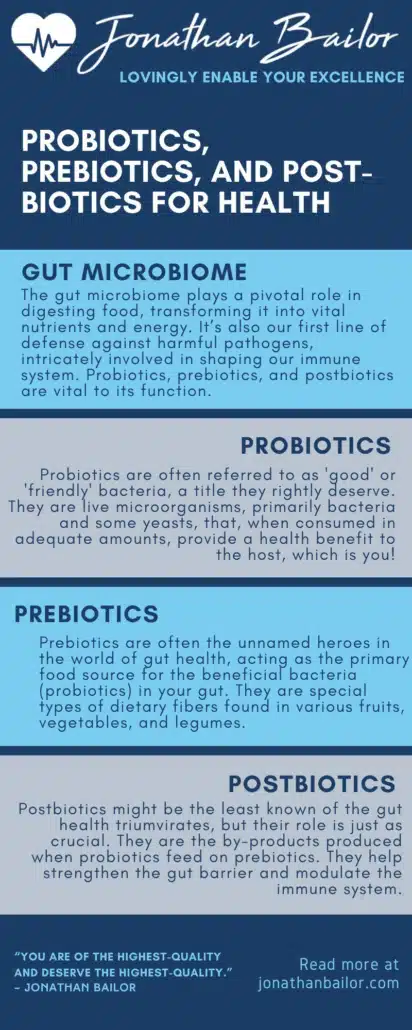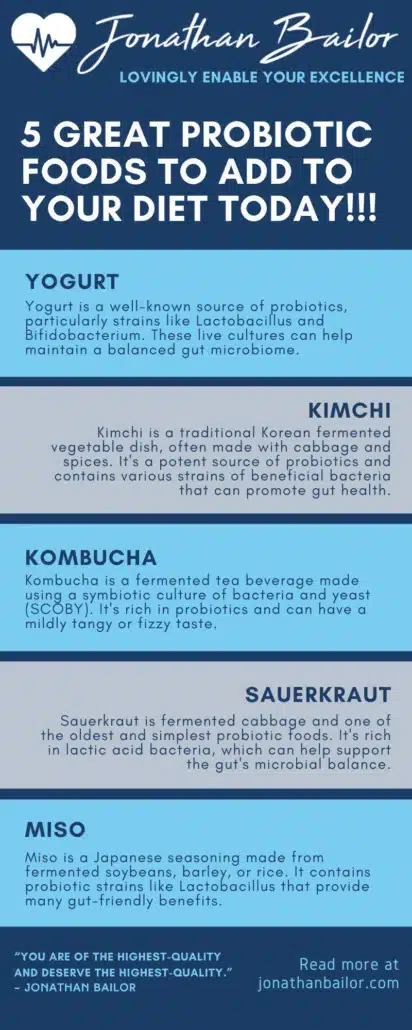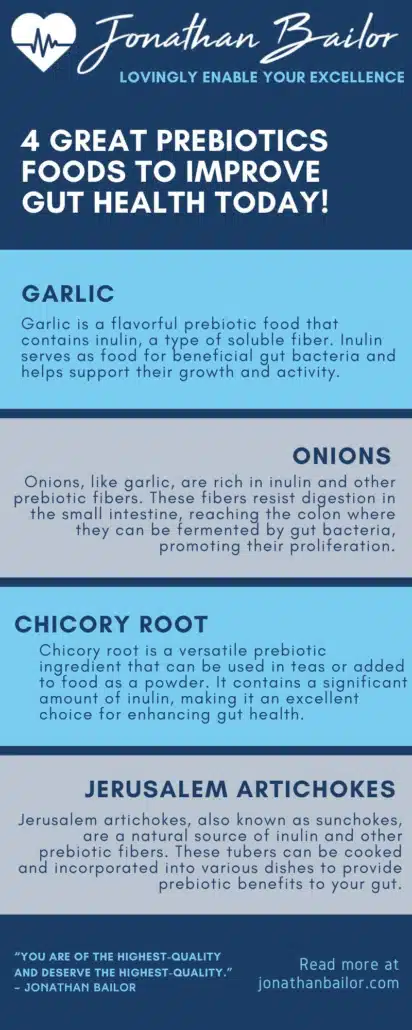Probiotics, Prebiotics, and Postbiotics: A Complete Guide
Imagine a bustling city within you, a metropolis teeming with inhabitants who are pivotal to your health and well-being. This isn’t a figment of imagination but a reality taking place in your gut, where trillions of microscopic residents, collectively known as the gut microbiota, play a crucial role in your health. Navigating this complex world of gut health can be overwhelming, but understanding the trio of probiotics, prebiotics, and postbiotics is like having a roadmap to optimal digestive wellness. This exploration into the Gut Health Guide with Jonathan Bailor offers an insightful journey into maintaining and enhancing your internal ecosystem for better health outcomes.
Let’s embark on a journey to explore these three key players. Probiotics, the beneficial bacteria, are like the friendly locals who maintain the city’s harmony. They help with digestion, boost immunity, and even influence mood. Imagine these probiotics as your personal health allies, tirelessly working behind the scenes to keep things running smoothly.
Next, we have prebiotics, the nourishment for these beneficial bacteria. Think of prebiotics as the favorite food of these friendly bacteria, helping them thrive and multiply. These dietary fibers, found in various fruits, vegetables, and other plant-based foods, are like the fuel that keeps the city’s energy high.
Lastly, postbiotics – a term you might be hearing for the first time. These are the beneficial compounds produced when probiotics feast on prebiotics. Consider them the by-products of a thriving city, the essential services that keep the community healthy. These substances are crucial in maintaining the integrity of the gut barrier and regulating the immune system.
Together, this trio works synergistically, creating a harmonious environment in your gut. Understanding their roles and how they interact is like unraveling the secrets of a thriving city within you. A balanced gut microbiome isn’t just about avoiding discomfort or bloating; it’s about laying the foundation for overall health, a state where your body functions at its best, allowing you to live life to the fullest.
As we navigate through this blog post, remember, this isn’t just about science and health; it’s all about equipping you with the right information that will help you make well-informed decisions for your own well-being.
So, whether you’re curious about improving your digestive health, boosting your immune system, or simply seeking ways to enhance your overall mental and physical health, this guide is your companion in this journey of discovery.
Stay tuned as we unravel the complexities of probiotics, prebiotics, and postbiotics in a way that’s not only easy to grasp but also practical to apply in your daily life.
And remember, sharing is caring. If you find this guide enlightening, don’t hesitate to share it with friends and family. After all, good health is a journey best traveled together.

Feeling Better Is Priceless, That's Why We Don't Put A Price On It!
“It’s Like A Free and Medically Valid Version of Noom and Weight Watchers Online”
~ Dr. Doctor Matthew Oleshiak, MD
Click the 'LEARN MORE' button below for free lifetime access to the fast fix program developed by Jonathan and top Ivy League Medical Doctors
LEARN MOREP.S. It's not a free trial. It's not part of the program for free. The entire program is free, forever, for real! No credit card needed.
Understanding Your Gut’s Inner World: The Gut Microbiome
In the vast and intricate world of our body, the gut microbiome stands out as a fundamental element. This complex community of bacteria, fungi, viruses, and other microorganisms residing in our digestive tract is not just a passive resident; it’s an active participant in our health, providing numerous health benefits.
The gut microbiome is like a skilled conductor, orchestrating various aspects of our well-being. It plays a pivotal role in digesting food, especially certain fibers and complex carbohydrates, transforming them into vital nutrients and energy. This means the gut microbiome is essential for a healthy metabolism, helping you lose weight (when necessary) and prevent weight gain.
Moreover, these tiny inhabitants are our first line of defense against harmful pathogens, forming a protective barrier. They are intricately involved in shaping our immune system, teaching it to distinguish between friend and foe. The gut microbiome also communicates with our brain, influencing our mood and mental health through what is known as the gut-brain axis.
Maintaining a balanced and diverse gut microbiome is akin to nurturing a flourishing garden, which is essential for overall health and resilience. As we explore further, we’ll discover how nurturing our gut microbiome with probiotics, prebiotics, and postbiotics is an investment in our long-term health and vitality.
Recognizing the Red Flags: Symptoms of Poor Gut Health
The gut is often referred to as the ‘second brain’ of our body, and for good reason. It’s intimately connected to various aspects of our health. When the balance of this gut ecosystem is disrupted, it doesn’t just upset our digestive system; it can manifest in a multitude of ways, some of which might surprise you. Understanding these symptoms can be the first step towards restoring gut health and overall well-being.
Symptoms and health conditions associated with poor gut health:
- Digestive Issues: Including bloating, gas, diarrhea, constipation, and irritable bowel syndrome (IBS).
- Unintended Weight Changes: unexplained weight gain or loss without changes in diet or exercise habits.
- Chronic Fatigue: persistent tiredness that doesn’t improve with rest.
- Skin Irritations: Conditions like eczema, rosacea, or acne may indicate gut problems.
- Food intolerances: difficulty digesting certain foods, leading to bloating, gas, diarrhea, abdominal pain, and nausea.
- Autoimmune Disorders: The gut’s role in immune function might contribute to conditions like rheumatoid arthritis or inflammatory bowel disease.
- Mood Disorders: The gut-brain axis links gut health to mood and mental health, influencing conditions like anxiety and depression.
These symptoms serve as indicators that your gut microbiome might be out of balance. They’re your body’s way of signaling that it’s time to pay attention to your gut health. Addressing these symptoms often starts with modifying your diet to include a balance of probiotics, prebiotics, and postbiotics, alongside other lifestyle changes.
Remember, nurturing your gut health is not just about feeling better in the moment; it’s about building a foundation for long-term health and vitality.
Now, let’s dive deeper into the properties and value of probiotics, prebiotics, and postbiotics.

Probiotics: The Beneficial Bacteria in Your Wellness Journey
Probiotics are often referred to as ‘good’ or ‘friendly’ bacteria, a title they rightly deserve. They are live microorganisms, primarily bacteria and some yeasts, that, when consumed in adequate amounts, provide a health benefit to the host, which is you!
These beneficial bacteria are key players in improving gut health, enhancing the absorption of nutrients, and bolstering the immune system. By maintaining a healthy balance of gut flora, probiotics help in keeping the digestive system running smoothly, reducing inflammation, and even potentially impacting mental health through the gut-brain connection.
Probiotic Foods
Here’s a list of some probiotic-rich foods to include in your diet that will help boost probiotics in your lower colon:
- Yogurt: Particularly unsweetened, natural yogurt. Make sure the label says that the yogurt contains “live, active cultures.”
- Kefir: A fermented probiotic milk drink
- Sauerkraut: Fermented cabbage, rich in probiotics
- Kimchi: is a spicy Korean side dish typically made from fermented cabbage
- Miso: A Japanese seasoning made from fermented soybeans
- Tempeh: A fermented soybean product
- Pickles: Cucumbers fermented in saltwater (not vinegar)
Including these fermented foods in your diet can be a delicious and natural way to support your gut health. Each of these probiotic-rich foods offers a unique blend of beneficial bacteria, contributing to the diversity of your gut microbiome.
Embracing these foods is not just about adding flavor to your meals; it’s about nourishing your body with the goodness of nature.

Prebiotics: Fueling the Friendly Flora in Your Gut
Prebiotics are often the unnamed heroes in the world of gut health, acting as the primary food source for the beneficial bacteria (probiotics) in your gut. They are special types of dietary fibers found in various fruits, vegetables, and legumes.
Unlike other nutrients, prebiotics aren’t digested by your body. Instead, they reach the colon intact, where they are fermented by the gut microflora, aiding in the growth and activity of probiotics.
Prebiotic Foods
To support your gut health with prebiotics, consider including these foods in your diet:
- Garlic: A versatile ingredient with prebiotic benefits
- Onions: Adds flavor and prebiotic fiber to dishes
- Leeks: Similar to onions, with a milder taste
- Asparagus: A nutrient-rich vegetable with prebiotic properties
- Chicory Root: A great source of inulin, a type of prebiotic fiber
- Jerusalem Artichoke: Not your typical artichoke, but a tuber rich in inulin
Incorporating these foods into your daily meals can significantly enhance the growth of beneficial gut bacteria. These aren’t just ingredients; they’re natural tools to nurture your internal ecosystem, promoting a balanced and thriving gut microbiome.
Remember, a happy gut is a stepping stone to overall health and well-being.

Postbiotics: The Unsung Heroes in Gut Health
Postbiotics might be the least known of the gut health triumvirates, but their role is just as crucial. They are the by-products produced when probiotics feed on prebiotics. Think of them as the beneficial compounds that emerge after the fermentation process in the gut. These include short-chain fatty acids like butyrate, acetate, and propionate, which play a key role in maintaining the health and integrity of your gut lining.
Postbiotics help strengthen the gut barrier, modulate the immune system, and have anti-inflammatory properties.
Boosting Postbiotics in Your Gut
The key to increasing postbiotics in your gut is to nurture your probiotics with prebiotics. Here’s how:
- Consume a variety of prebiotic-rich foods, like garlic, onions, and bananas.
- Include probiotic foods in your diet, such as yogurt and kefir.
- Focus on a balanced diet that supports the growth of beneficial gut bacteria.
By ensuring your gut flora gets its needed prebiotics and probiotics, you’re essentially setting the stage for the production of health-promoting postbiotics.
It’s not about targeting one specific component but fostering an environment where your gut microbiome can thrive and produce these beneficial postbiotics.
Remember, a harmonious gut is a cornerstone of overall wellness.
Essential FAQs on Nurturing Your Gut Health
1. What is the gut microbiome, and why is it important?
The gut microbiome is a complex community of microorganisms living in your digestive tract. It plays a crucial role in digestion, nutrient absorption, and immune function.
A balanced microbiome aids in breaking down food, producing vital vitamins, and protecting against harmful bacteria. It’s not just about gut health; it influences overall well-being, including mental health, through the gut-brain axis.
2. How can I tell if my gut microbiome is out of balance?
Signs of an imbalanced gut microbiome include digestive issues like bloating, gas, constipation, or diarrhea. You might also experience unexplained weight changes, chronic fatigue, skin irritations, or mood swings.
These symptoms can indicate that your gut flora needs attention, and adjusting your diet and lifestyle might be necessary.
3. Can changing my diet improve my gut health?
Absolutely! Including a variety of probiotic-rich foods, like yogurt and fermented vegetables, can boost beneficial bacteria. Prebiotics found in foods like garlic and bananas feed these good bacteria.
Also, reducing the intake of processed foods and sugars can help maintain a healthy gut environment. A balanced diet is key to a thriving gut microbiome.
4. Are there any specific foods I should avoid for better gut health?
For optimal gut health, it’s advisable to minimize the intake of heavily processed foods, artificial sweeteners, and high-sugar products. These can disrupt the delicate balance of your gut microbiome.
Additionally, if you have food intolerances or sensitivities, avoiding trigger foods can help maintain gut harmony.
5. Can stress affect my gut health?
Yes, stress can significantly impact your gut health. It can alter the gut microbiome’s composition and function, leading to issues like increased inflammation or digestive problems.
Managing stress through relaxation techniques, adequate sleep, and exercise can positively affect your gut health and overall well-being.
Embracing Gut Health: A Journey to Share
As we conclude our exploration into the vibrant world of gut health, remember that nurturing your gut is not just a personal journey; it’s a path to share with others. By understanding the roles of probiotics, prebiotics, and postbiotics and recognizing the signs of gut imbalance, you’re equipped to make informed choices for your well-being.
Don’t keep this knowledge to yourself. Spread the word among friends and family through social media platforms and email. Sharing this guide could be the first step in helping someone begin their own journey toward better health. Remember, when it comes to wellness, we’re all in this together.
Feeling Better Is Priceless, That's Why We Don't Put A Price On It!
“It’s Like A Free and Medically Valid Version of Noom and Weight Watchers Online”
~ Dr. Doctor Matthew Oleshiak, MD
Click the 'LEARN MORE' button below for free lifetime access to the fast fix program developed by Jonathan and top Ivy League Medical Doctors
LEARN MOREP.S. It's not a free trial. It's not part of the program for free. The entire program is free, forever, for real! No credit card needed.




